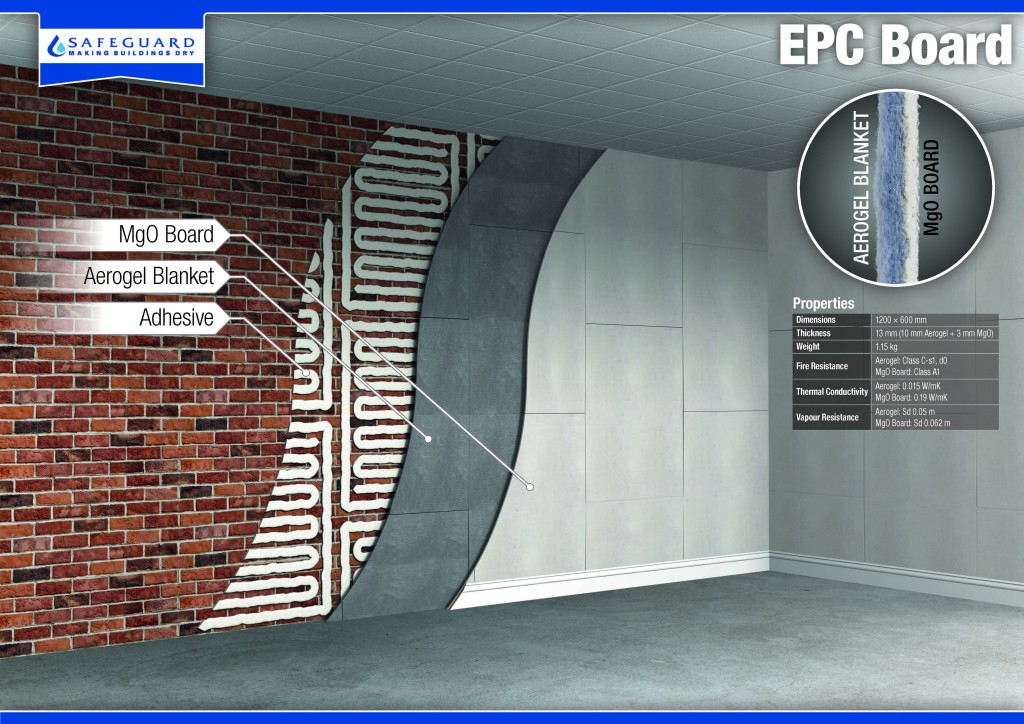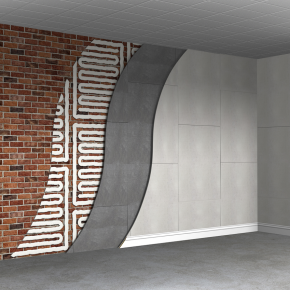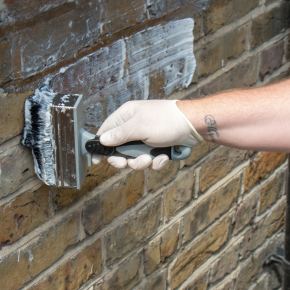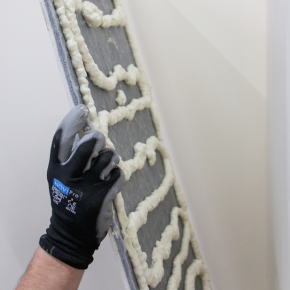
Insulation technologies to cut eco-refurb costs with Safeguard Europe
With new energy efficiency standards now in force, some landlords are facing significant refurbishment costs. Advanced insulation technologies could help ease the financial burden, says Hudson Lambert of Safeguard Europe.
“On 1 April this year, the Minimum Energy Efficiency Standards (MEES) came into force. These say that say that all commercial and residential properties must achieve an Energy Performance Certificate (EPC) of Grade E or above to be rented out.
One group of properties which present a particular problem are those with solid walls, which have historically been difficult and costly to insulate. And this is no small problem. The National Insulation Association (NAI) estimates that around 36% of the UK’s 24.5 million dwellings have solid walls of brick, stone or concrete.
However, new, more cost-effective solutions are coming to market. Materials engineers are making use of new technologies to create incredibly slim insulation which boosts a property’s U-value at a fraction of the cost and with far less disruption.
Developed in the aerospace and oil and gas sectors, these aerogels exhibit the lowest thermal conductivity of any material.
By combining aerogel insulation with a masonry cream which keeps walls dry, and hence means they will conduct less heat, it is possible to boost a property’s EPC rating significantly.
Smaller properties will move from F to E rating with these measures alone, while larger ones will require a limited amount of additional expenditure.
The MEES, which came out of The Energy Act 2011, currently applies only to properties that are being let for the first time or where the lease is being renewed. There are some exceptions: listed buildings, conservation areas and buildings which are deemed to have had as much energy upgrade work as possible. Very short leases are also exempt.
From April 2020 MEES will apply to all rented homes, and from April 2023, all rented commercial properties must meet the grade. This means that landlords only have a limited time to make the necessary upgrades to their properties.
The first place to start is the fabric of the building: walls, roof, windows, doors. By far the greatest heat loss is through a property’s walls.
Take the example of a Victorian end-of-terrace house (see pie chart), which, even with loft insulation and double glazing has still been given an EPC rating of F. This is because over half of the heat lost, 54%, is passing through the walls.
A lack of insulation is an obvious reason for the huge heat loss but another likely contributor is damp walls. As well as causing discomfort and potential health problems, damp walls increase the rate of heat loss by a factor of up to two.
Bring on the technology
Historically solid walls have been treated by adding insulating boards to either the internal or external face of the wall. Both options raise significant challenges for landlord, tenant or an owner-occupier for that matter.
External wall insulation (EWI) requires a large capital outlay, between £8,000 and £22,000 per home according to the NAI and requires economies of scale to make it viable.
EWI has been most often applied to local authority or housing association-owned apartment blocks. For individual homes, the holy grail would be to persuade a whole street to invest in EWI, but the political and economic mechanisms to do that have not been created.
Internal wall insulation (IWI) is a more cost-effective option, requiring a capital investment of between £4,000 and £13,000 according to the NAI.
But it can be disruptive for householders, and could mean that a landlord must lose a tenant and suffer from a rent-free period, as well as the costs associated with securing a new tenant once the work is done. IWI also reduces the space inside a room and can mean that period features are sacrificed or recreated at some cost.
It is worth noting that both EWI and IWI, if improperly designed or installed, have the potential to exacerbate or create damp problems in a wall. EWI applied to a wall with rising damp, which remains untreated, will make the problem worse. IWI can cause condensation to form behind the insulation leading to damp and mould.
As with any energy efficiency improvement measure, it is always important to take a holistic view of a property and the way it works to avoid causing more problems than are solved.
One potential solution is a system approach which combines super-slim aerogel technology and a masonry cream that allows wet walls to dry out while preventing moisture getting in.
Because these aerogel materials are super-insulators they can still have a significant impact when applied in very slim layers. Safeguard’s Stormdry EPC, for example, is a panel just 13mm thick. This means that they can be applied with features such as skirtings and covings left in place, if necessary, by using trim beads.
When it comes to selecting the right masonry cream, it’s important to choose one that allows water inside the wall to evaporate out while preventing moisture from outside penetrating inwards. Safeguard’s Stormdry, for instance, achieves this by coating the inside of the pores of the substrate, rather than by blocking them up.
For that Victorian end-of-terrace property cited earlier, the application of the combined slim insulation and masonry cream changes the U-value of the walls from 1.7 W/m2K when damp and uninsulated to 0.8 W/m2K when treated.
The cost for the basic materials for this system would be around £20m2 of wall for the masonry cream and £60m2 for the insulation.
The application of such a system is good news for the tenants as well as the landlord. They could expect to save nearly 30% percent on their heating bills every year.”
Contact:
Safeguard Europe,
Redkiln Close,
Horsham,
West Sussex,
United Kingdom,
RH13 5QL
Phone: 01403 210204
Fax: 01403 217529
Visit Safeguard Europe's website
Visit Supplier's page
Latest news

2nd April 2025
FIT Show 2025 Launches Innovative Marketplace Feature to Enhancing Value for Installers
FIT Show, the UK’s leading event for the window, door, flat glass, hardware, and roofing industries, is excited to announce the launch of a brand new Marketplace feature at its upcoming 2025 event (Birmingham NEC, 29 April – 1 May).
Posted in Architectural Ironmongery, Articles, Building Industry Events, Building Industry News, Building Products & Structures, Doors, Exhibitions and Conferences, Glass, Glazing, Hand Tools, Innovations & New Products, Plant, Equipment and Hire, Power Tools, Restoration & Refurbishment, Retrofit & Renovation, Roofs, Seminars, Training, Windows
2nd April 2025
Hi-spec deployment of EJOT Colorfast at new Birmingham logistics park
EJOT Colorfast fasteners have been used extensively in the construction of eight new high-specification warehousing and logistics buildings at the Urban 8 Logistics Park in King’s Norton, Birmingham.
Posted in Articles, Building Industry News, Building Products & Structures, Building Systems, Case Studies, Facades, Restoration & Refurbishment, Retrofit & Renovation, Roofs, Walls
2nd April 2025
SWA member delivers ‘fresh Hope’ for university’s Sustainable Building department
A detailed contract to restore an iconic Art Deco building in the heart of Birmingham’s Jewellery Quarter was carried out by Steel Window Association member, The Window Repair Company (Northwest) Limited.
Posted in Articles, Building Associations & Institutes, Building Industry News, Building Products & Structures, Building Systems, Case Studies, Glass, Glazing, Restoration & Refurbishment, Retrofit & Renovation, Steel and Structural Frames, Sustainability & Energy Efficiency, Windows
1st April 2025
Gilberts Takes Thermal Comfort to New Heights
Gilberts Blackpool is continuing to build on its reputation as a pioneer with the unveiling of ThermaAstute™ – the most extensive range of thermally sensitive diffusers in the market.
Posted in Air Conditioning, Articles, Building Industry News, Building Products & Structures, Building Services, Facility Management & Building Services, Heating, Ventilation and Air Conditioning - HVAC, Innovations & New Products, Restoration & Refurbishment, Retrofit & Renovation, Sustainability & Energy Efficiency
 Sign up:
Sign up: 



